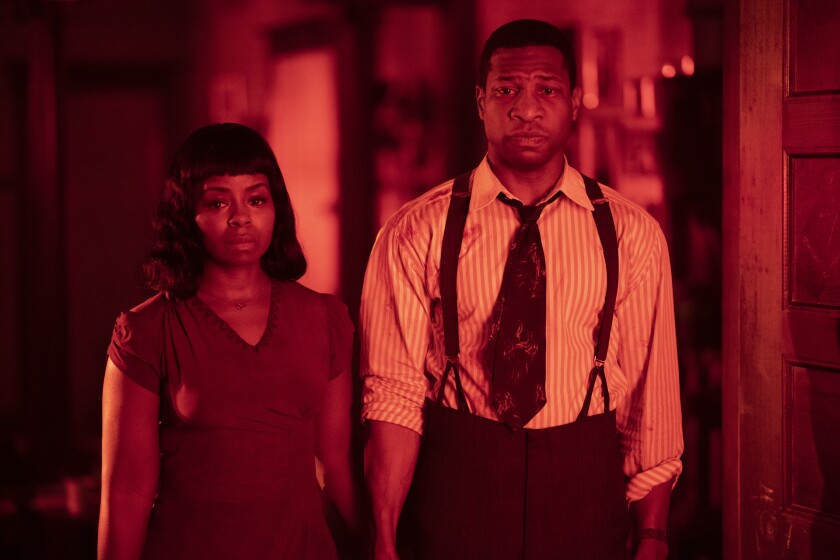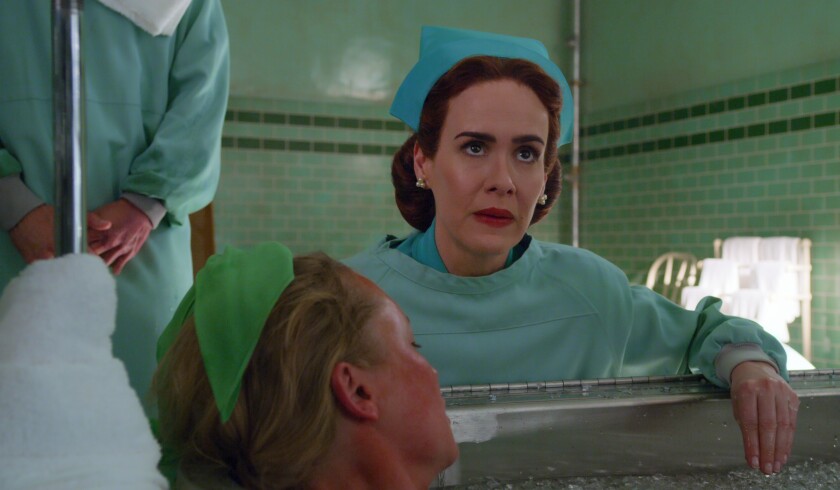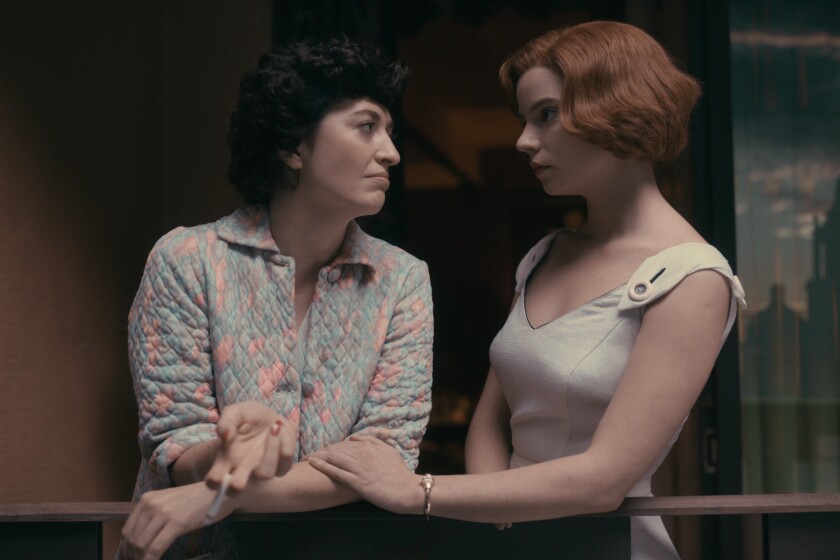Black characters are hunted, persecuted and worse. Gay people are boiled alive. Women are shunted aside.
Welcome to the middle of the 20th century, as imagined by some of the most prestigious TV series of this awards season. Shows like “Lovecraft Country,” “Them,” “Ratched” and “The Queen’s Gambit” depict a potently non-romantic 1950s-era past. We’re a far cry from “Happy Days.”
Filtering horror movie and melodrama ideas through thoroughly modern sensibilities, these series leave an acidic aftertaste as their heroes fight to be treated as human beings.
Sometimes the goal is dignity. Others, basic survival.
Take “Lovecraft Country,” the HBO fantasy series based on the novel by Matt Ruff. Borrowing from pulp horror master H.P. Lovecraft, the series takes us on a journey through Jim Crow America of the ‘50s, North and South. Its torments include real-life horrors (the 1921 Tulsa Massacre, the 1955 murder of Emmett Till, bloodthirsty town sheriffs, burning crosses on the lawn); a white, spell-casting secret society; and various monsters, spirits and demons.
Set largely in Chicago, “Lovecraft,” executive produced by J.J. Abrams, Misha Green and Jordan Peele, combines the fantastic with the all-too-real. It also uses music, from Fats Domino to Cardi B, to connect yesterday to today.
“For Black people, the real world is just as scary as the horror world. With ‘Lovecraft Country,’ we’re telling a story about generational trauma and Black life in America, and then we put all the monsters on top of that,” Green previously told The Envelope.
Production designer Kalina Ivanov echoes that thought. “Each episode’s complex themes and historical events also shine a light on the topography of American racism, and really bring the idea that people can be much scarier than giant monsters.”

Erica Tazel and Jonathan Majors in “Lovecraft Country”.
(Eli Joshua Ade/HBO)
One way to sum up “Lovecraft Country”: Jim Crow is horror. This theme applies with even greater conviction to “Them,” the disturbing anthology series on Amazon Prime.
Set in 1953, two years before the main action of “Lovecraft Country,” “Them” is a particularly ghastly take on the Second Great Migration, in which some 5 million African Americans moved from the South to theoretically more tolerant parts of the country. But when Lucky (Deborah Ayorinde), her husband Henry (Ashley Thomas) and their two daughters relocate to Southern California’s Compton, they find terrors awaiting them.
First there are the neighbors, all white, led by Alison Pill’s Betty Wendell. They’ll do anything to keep Black people out of the neighborhood (yes, at that time, Compton was largely white). But, like in “Lovecraft,” the supernatural and the racist go hand in hand.
Still suffering from the unspeakable trauma that hastened their departure from North Carolina, Lucky and Henry face hauntings, hallucinations and the certainty that their sanity is on shaky ground. In “Them,” created by Little Marvin, mental illness is both a cause and result of violent racism. “Them” can be both hard to watch and hard to turn away from.
Mental illness is front and center in “Ratched,” as is sexual orientation. The first season of the Netflix series, co-created by Ryan Murphy and Evan Romansky, tells a sort of origin story of Mildred Ratched (Sarah Paulson), the loathed and feared head nurse played by Louise Fletcher in the 1975 movie “One Flew Over the Cuckoo’s Nest,” here lending her sociopathic services to a lushly decorated mental hospital in a gorgeous Big Sur town.
The year is 1947 — Season 2 will take place in the ‘50s — and various forms of cruel and unusual, real-life mental health treatments are en vogue and often tried on gay and lesbian patients. The lobotomy is a favorite, a swift blow with a hammer and ice pick straight through the eye socket. So is hydrotherapy, which, in “Ratched,” consists of soaking patients in alternating boiling hot and freezing cold water.

Sarah Paulson as nurse Mildred Ratched in “Ratched.”
(Netflix)
There’s plenty of camp and the macabre in “Ratched,” as there is in most Murphy productions. There are stylish nods to past masters such as melodrama king Douglas Sirk and Master of Suspense Alfred Hitchcock (including a score that borrows liberally from frequent Hitchcock collaborator Bernard Herrmann).
But the barbaric medical treatments were all too real.
“It was important to us to depict what members of the LGBTQ community had to endure and what amounted to torture as treatments for people who had nothing wrong with them,” Romansky says by phone. “We didn’t have to walk through the hidden door, down to a dingy basement where they were doing these sadistic, diabolical procedures in secret. These were out in the open. They were common practice, and they were even celebrated as a crowning achievement from the medical field.”
“The Queen’s Gambit,” the Netflix limited series poised to clean up big on Emmy night, has no torture, no monsters and no violent racist attacks. Just Beth Harmon (the revelatory Anya Taylor-Joy), an orphan-turned-chess-master trying to show she can dominate in a chauvinistic world. (Spoiler: She does.)
In this sense, the limited series, created by Scott Frank and Allan Scott, is like “Mad Men” and “The Marvelous Mrs. Maisel,” which ask viewers to consider what it was like to be a woman with talent and ambition in the ‘50s and ‘60s (the show bridges the two decades). But, says costume designer Gabriele Binder, it’s not Beth but another character that best dramatizes the sexism of the era.

Marielle Heller and Anya Taylor-Joy in “The Queen’s Gambit.”
(COURTESY OF NETFLIX/COURTESY OF NETFLIX)
Beth’s adoptive mother, Alma (Marielle Heller), is a gifted pianist stuck at home with an uncaring husband. Like Beth, she’s addicted to alcohol and tranquilizers. As Beth climbs through the competitive chess ranks, Alma lives vicariously through her new daughter. Representing a different generation, Beth overcame sexism to achieve what Alma can’t.
“Beth is a kind of tranquilizer that soothes Alma’s pain of having missed out on so much in life and love,” Binder says by phone. “She is bathing in self-pity until she starts managing Beth’s career.”
One thing you won’t find in these shows? Nostalgia, even when the aesthetics are at their most stylish. This is the ‘50s era imagined as a bad dream, in which possibilities exist only for a select few. At least Beth is able to crash the party. She’s able to push all the way into the ‘60s, a more modern period that permits a glimpse of the future, and the possibility of a better day.
window.fbAsyncInit = function() { FB.init({
appId : '134435029966155',
xfbml : true, version : 'v2.9' }); };
(function(d, s, id){ var js, fjs = d.getElementsByTagName(s)[0]; if (d.getElementById(id)) {return;} js = d.createElement(s); js.id = id; js.src = "https://connect.facebook.net/en_US/sdk.js"; fjs.parentNode.insertBefore(js, fjs); }(document, 'script', 'facebook-jssdk'));
Stay connected with us on social media platform for instant update click here to join our Twitter, & Facebook
We are now on Telegram. Click here to join our channel (@TechiUpdate) and stay updated with the latest Technology headlines.
For all the latest Entertainment News Click Here
For the latest news and updates, follow us on Google News.
